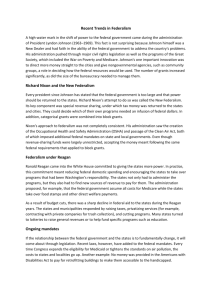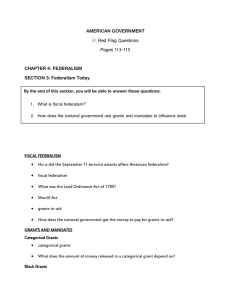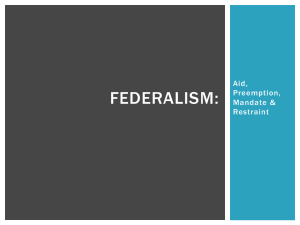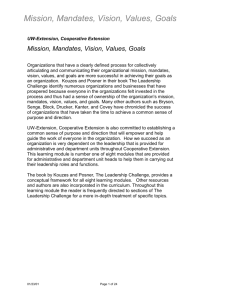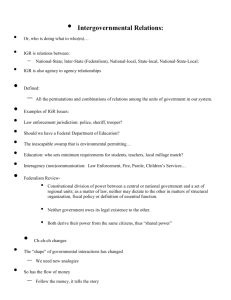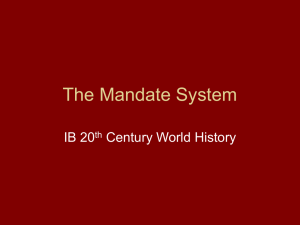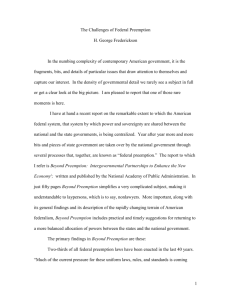the national budget as a tool of federalism
advertisement
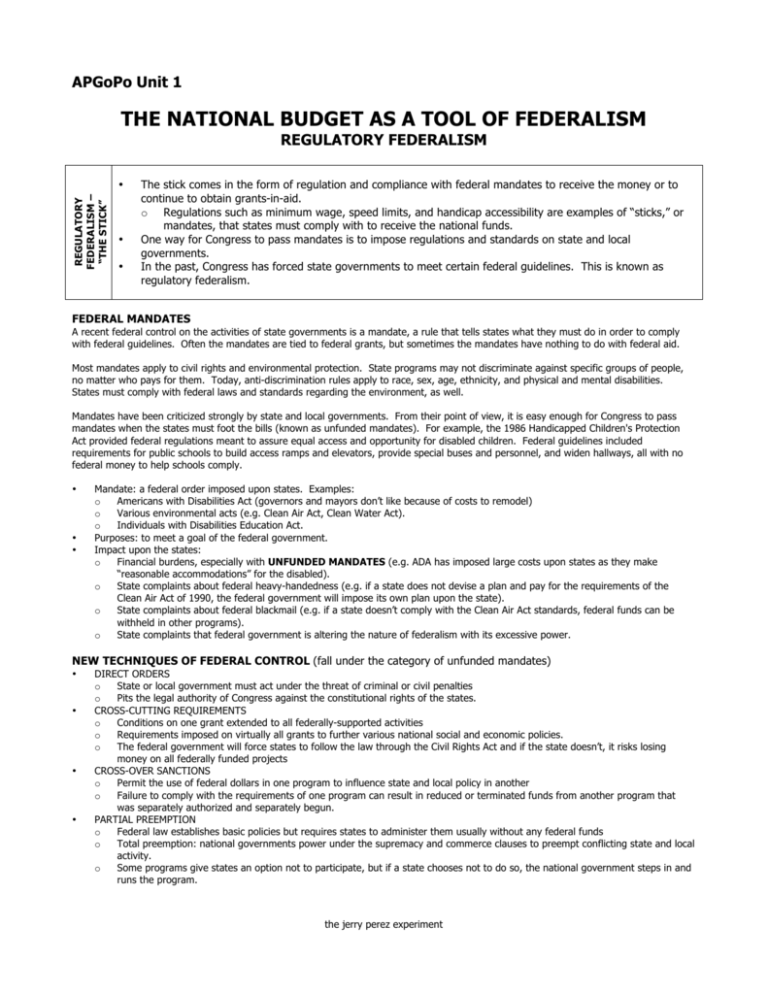
APGoPo Unit 1 THE NATIONAL BUDGET AS A TOOL OF FEDERALISM REGULATORY FEDERALISM REGULATORY FEDERALISM – “THE STICK” • • • The stick comes in the form of regulation and compliance with federal mandates to receive the money or to continue to obtain grants-in-aid. o Regulations such as minimum wage, speed limits, and handicap accessibility are examples of “sticks,” or mandates, that states must comply with to receive the national funds. One way for Congress to pass mandates is to impose regulations and standards on state and local governments. In the past, Congress has forced state governments to meet certain federal guidelines. This is known as regulatory federalism. FEDERAL MANDATES A recent federal control on the activities of state governments is a mandate, a rule that tells states what they must do in order to comply with federal guidelines. Often the mandates are tied to federal grants, but sometimes the mandates have nothing to do with federal aid. Most mandates apply to civil rights and environmental protection. State programs may not discriminate against specific groups of people, no matter who pays for them. Today, anti-discrimination rules apply to race, sex, age, ethnicity, and physical and mental disabilities. States must comply with federal laws and standards regarding the environment, as well. Mandates have been criticized strongly by state and local governments. From their point of view, it is easy enough for Congress to pass mandates when the states must foot the bills (known as unfunded mandates). For example, the 1986 Handicapped Children's Protection Act provided federal regulations meant to assure equal access and opportunity for disabled children. Federal guidelines included requirements for public schools to build access ramps and elevators, provide special buses and personnel, and widen hallways, all with no federal money to help schools comply. • • • Mandate: a federal order imposed upon states. Examples: o Americans with Disabilities Act (governors and mayors don’t like because of costs to remodel) o Various environmental acts (e.g. Clean Air Act, Clean Water Act). o Individuals with Disabilities Education Act. Purposes: to meet a goal of the federal government. Impact upon the states: o Financial burdens, especially with UNFUNDED MANDATES (e.g. ADA has imposed large costs upon states as they make “reasonable accommodations” for the disabled). o State complaints about federal heavy-handedness (e.g. if a state does not devise a plan and pay for the requirements of the Clean Air Act of 1990, the federal government will impose its own plan upon the state). o State complaints about federal blackmail (e.g. if a state doesn’t comply with the Clean Air Act standards, federal funds can be withheld in other programs). o State complaints that federal government is altering the nature of federalism with its excessive power. NEW TECHNIQUES OF FEDERAL CONTROL (fall under the category of unfunded mandates) • • • • DIRECT ORDERS o State or local government must act under the threat of criminal or civil penalties o Pits the legal authority of Congress against the constitutional rights of the states. CROSS-CUTTING REQUIREMENTS o Conditions on one grant extended to all federally-supported activities o Requirements imposed on virtually all grants to further various national social and economic policies. o The federal government will force states to follow the law through the Civil Rights Act and if the state doesn’t, it risks losing money on all federally funded projects CROSS-OVER SANCTIONS o Permit the use of federal dollars in one program to influence state and local policy in another o Failure to comply with the requirements of one program can result in reduced or terminated funds from another program that was separately authorized and separately begun. PARTIAL PREEMPTION o Federal law establishes basic policies but requires states to administer them usually without any federal funds o Total preemption: national governments power under the supremacy and commerce clauses to preempt conflicting state and local activity. o Some programs give states an option not to participate, but if a state chooses not to do so, the national government steps in and runs the program. the jerry perez experiment
